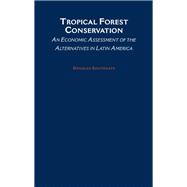Tropical Forest Conservation An Economic Assessment of the Alternatives in Latin America
, by Southgate, Douglas- ISBN: 9780195109962 | 0195109961
- Cover: Hardcover
- Copyright: 6/4/1998
Attempts to halt the destruction of rain forests and other natural habitats in the tropics have met with little success. In particular, national parks, like those found in wealthy nations, have proven difficult to establish in Africa, Asia, and South and Central America. More often than not, people inhabiting areas designated for protection resist being told by outsiders that they must change how and where they live. Alternative approaches, frequently embodied in integrated conservation and development projects (ICDPs), are now being pursued. The goal is to address local communities' desires for improved standards of living while simultaneously meeting conservation objectives. Nature-based tourism and sustainable harvesting of forest products are the centerpieces of ICDPs and related initiatives. This book assesses the viability of conservation strategies predicated on the adoption of environmentally sound enterprises in and around threatened habitats. Drawing on research in Brazil, Costa Rica, Ecuador and Peru and on his extensive experience working in South and Central America and the Caribbean, the author demonstrates that it is rare for forest dwellers to derive much benefit from ecotourism, the extraction of timber and other commodities, or the collection of samples used in pharmaceutical research. Often these activities are simply unprofitable. Even when they are profitable, the benefits tend not to accrue locally, but instead are captured by outside firms and individuals who can provide important services like safe and reliable transportation. The author contends that human capital formation and related productivity-enhancing investment is the only sure path to economic progress and habitat conservation.






